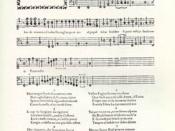Peri's Euridice (1600)
Jacopo Peri's Euridice, the earliest opera to survive in its entirety, is clearly indebted to Poliziano's play. Like the Orfeo, the Euridice combines the pastoral and tragic traditions, creating a sentimental, almost "romantic" tone. Pastoral elements in the opera include the band of shepherds who form the retinue of Orpheus and Eurydice and, most importantly, the frequent use of the pathetic fallacy. For instance, at the beginning of the opera, Ottavio Rinuccini's libretto states that there is not an animal in the forest, a bird in the trees, or a fish in the streams that fails to rejoice at the news of Orpheus and Eurydice's betrothal (Che non e fera in bosco, augello in fronda, o muto pesce in onda, ch' oggi non formi, e spiri dolcissimi d' amor sensi, e sospiri: Scene 1). Orpheus says that, once Eurydice is his wife, the plants and trees that had sighed in sadness at his songs will no longer have cause for tears (Scene 2).
And yet, this planned marriage never takes place. Eurydice dies and "clouds of mourning" (nube di duol: Scene 2) shroud the joys of the sun. In a repeated refrain, the chorus asks the breezes and woods to join them in their lament (Scene 2). The shepherd Arcetro tells the chorus that the sorrow of Orpheus is so intense that animals, plants, fields, and flowers have all joined him in his grief (le fere, e le piante, e l'erbe e i fiori, sospirar seco e lamentar s'udiro: Scene 3). Even in the underworld, Orpheus asks the mournful shores and dreaded fields (funeste piagge, ombrosi orridi campi) to echo the sounds of his lament (Scene 4). Finally, at the end of the opera, when Eurydice is restored to Orpheus, the singer tells the leafy woods...


